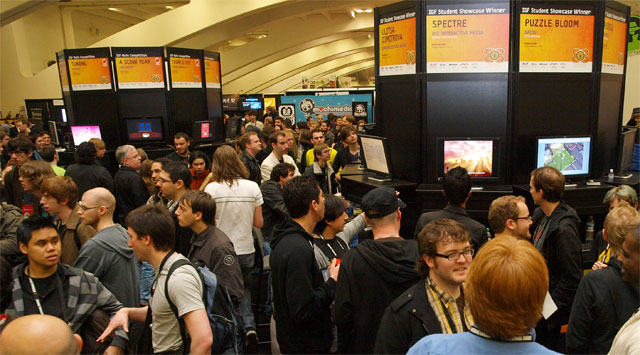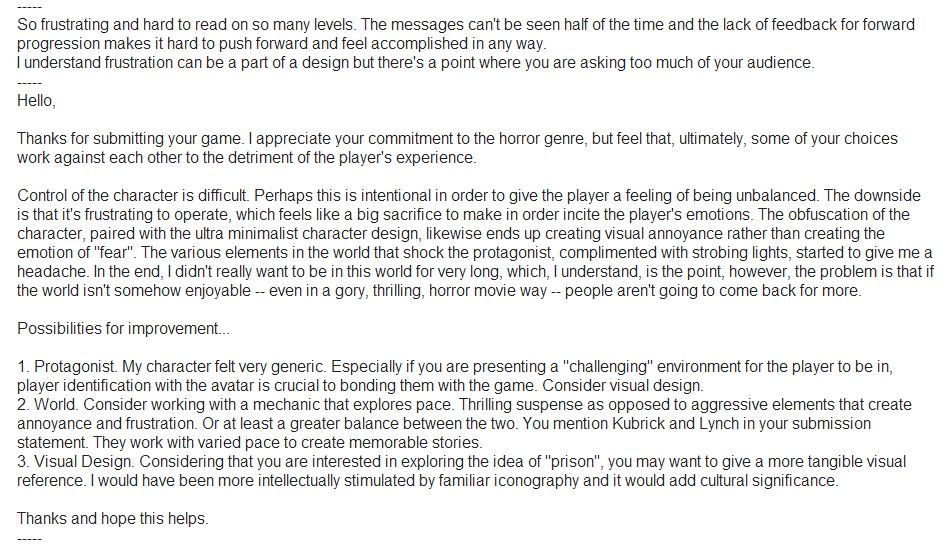========================================
before i begin, i want to make this clear: these are two problematic terms. i chose a slightly provocative title for a queer conference because "queer" itself, despite being a very inclusive term in a lot of ways, comes with a lot of implications and baggage for a lot of different people. the label tends to embody a more western, white, urban, educated sensibility. but i want to be clear: femininity and masculinity are abstract concepts as they exist in our culture. it is not my intention to back any prescriptive definitions about gender norms or behavior. at heart i think they are really a pieced together assemblages of ideas into oppressive archetypes, and what gender or identity you assign them to really doesn't matter.
in the same way, i say "abstract" to mean an idea that exists in our culture of something that is more ephemeral, and not representational way we think about representation. we might see the abstract as frivolous, or incomprehensible, or messy, or incomplete. but "abstract" is a term that could be applied in many ways to mean many different things. so it's important to recognize that these terms are constructions, and ones with much of the language of oppression built into them.
so yes, these issues are hard to talk about with correct terms, but in itself the idea of an inherent correctness or consistency to a set terms we can use and all know what it means is part of the problem. the more weight you place into a concept the more it begins to crumble. the more you look into this issue, the farther things spiral down into a wormhole.
====
Erin Stephens-North talks about this issue as a divide between "maleness" and "femaleness" is in her excellent essay gender and brilliance:
maleness enables “the explicit.” it is also a culture, a culture of the illuminated, the visible. maleness manifests in “seeing,” “naming” and “doing,” as these words are commonly understood. it is the means by which anything is done—the means by which a thought is thought, a piece is crafted, a scene is surveyed. it is language. it is whatever is acknowledged as common currency amongst human beings. maleness asks: “so what are you saying?” or “so what do you do with this?”
femaleness is the reason for the doing. femaleness is reality. femaleness is anything that must be believed in before it is seen. it cannot and will not speak. it learns and speaks of itself only through maleness. it is the expanse of infinite possibility. it has no nature.
to be male is to be “consistent.” to be female is to appear to be inconsistent.
the vast majority of female brilliance is lost (or is invisible), not because brilliant female-thinking people do not attempt to communicate what they see through various forms of expression, nor for the reason that they do not understand the principles of logic, aesthetic consistency or craftsmanship, but because they encounter the obstacles to communication associated with femaleness.
==============
there's that saying: if you ever see someone credited as Anonymous in history, they're almost always female.
on its face art could be the embodiment of this female idea, but in actuality the art that's been made - and the way we think about and talk about that art has really been defined by this "maleness" way of thinking to idealize and imprison and co-opt and use the "femininity" and "abstract"-ness to its own ends, just as the rest of the Western world has been.
and i think these ideas end up culturally inherently circling back down to this archetypal, cultural idea of "masculinity" vs. "femininity" at their core.
if we look at different media, especially at the inception of this media, or the beginning of movements within it, we see the presence of women whitewashed over and made invisible. you see this visually represented in this cartoon about the state of comics by sloane i took from twitter a few days ago.
there's something about newness in itself that embodies this "feminine" or "mysterious" ideal.
look at the situation at the inception of film: “during the teens, 1920s, and early 1930s, almost one quarter of the screenwriters in Hollywood were women. Half of all the films copyrighted between 1911 and 1925 were written by women.” we all know what happened afterwards.
in visual art, earlier i was embarrassed did not know a single visual artist who i could name as a favorite who was female. so i started searching for stuff online - and i eventually found quite a few artists by resorting to clicking on random people from the list of "female visual artists" an wikipedia, and a lot of interesting stuff came up - but basically none of it i'd ever heard of. like Jacquine Lamba (who is apparently most well known for having sex with Fridha Kahlo by the way). a lot of her early work is lost. i can't even find a bigger version of this excellent-looking painting anywhere online. i'm almost positive if she was male this would not be the case.
one of the most haunting things for me is an interview with Nico, towards the end of her life. the interviewer asked her if she have any regrets about her career. she said she regretted that she was never born a man.
in, electronic music (a subject dear to me), women played a vital role as pioneers. three well known examples are
delia derbyshire
wendy carlos
laurie anderson
but then here a quote from one of the most well-known and well-respected electronic musicians of any gender in 2008:
"it feel(s) like still today after all these years people cannot imagine that woman can write, arrange or produce electronic music. i have had this experience many many times that the work i do on the computer gets credited to whatever male was in 10 meter radius during the job. people seem to accept that women can sing and play whatever instrument they are seen playing but they cannot program, arrange, produce, edit or write electronic music."
spoiler alert: it was this lady.
===============================
okay, so i wanted to look at a bit of a talk about the two hemispheres of the brain from iain macgilchrist, who is a neuroscientist and psychiatrist. i'm gonna gloss over a lot of the talk about the differences between the two hemispheres so you can get the important bits of it.
(i'm just going to link to the whole talk on youtube here).
=================================
the thing i wanted to point out is the obvious and eerie similarities between the divide between "femaleness" and "maleness", or "femininity" and "masculinity", and the described divide between the right and left hemispheres of the brain.
regardless of what is or isn't neuroscience truth, i think this at least suggests that there's some kind neurological basis for why we as humans continue to fall into these traps, and that it's a very easy trap to fall into. in a sense maybe if we take the time to understand this, we're kind of escaping some of the weaknesses of our biological programming and reprogramming ourselves.
in a sense, digital games seem to embody the kind of mechanical, virtual, fixed way that favors the left brain's point of view. but there's also something strangely...resistant about games. there's something fundamentally unknowable about them to us, and because of that we still kind of fear them. no matter how much we vie for mechanical perfection in the worlds we make, some bug in the system inevitably seems to push back at us and subvert our desire to beat it down and fashion it into our perfect utopian visions. this might be true in all art, but with games because there's still something so new and visceral, and upsetting about them to us.
there's this idea, a sort of trend in games spaces now of games approaching something "real" on the horizon - either in the strict material terms, as in being representational of real human environments in terms of look or feel. like in AAA games. or representing of something we understand as being part of the human experience, like in a direct personal, autobiographical videogame.
but this "reality" is really only an idea we have of reality, an idea that's created and maintained by our culture, an idea that's slowly slipping into the water and many people are frantically trying to grab onto the last still sinking bits of it to make any kind of sense of what's happening in the world.
in art, this is kind of goes with the divide between what we think of as modern and post-modern. or about high/low art.
it's in these dichotomies:
but digital art is completely changing the ways that art is made, completely exposing and making irrelevant existing models of thinking about and evaluating art in ways that could've only been in our wildest imagination in the past.
in visual art, now we have:
painting
vs. comic art, but also
digital art (this is from a hubble telescope photo). or god forbid
pixel shit
in music: symphonies or (more contemporarily)
the album as great cultural event vs.
digital mixtape/soundcloud/bandcamp or god forbid
chiptune or midi music
movies:
feature-length film vs.
digital short, or god forbid:
let's play
in the written word:
the grand, sweeping novel
vs. poem or short story, or god forbid:
IF/twine game, or even more god forbid:
fan fiction
and at all the end of all these different totem poles of expressive artistic worth we have videogames and their related offshoots scraping the bottom of the barrel. and so we can effectively understand their existence as novelties, or something cute, or machines that can be tweaked, or objects to be fetishized, but not anything more than that. we admire them for how completely and obediently machine-like they can be, and yet we laugh at their "videogamey" weirdness like it's a horrible, garish, weakness.
to go back to Erin's essay:
most great “female” minds have created effective pieces through working in relatively simple media, rather than attempting to control extraordinarily large projects with many variables.
the vast majority of female brilliance is lost...
femaleness... femininity... is lost.
we want to just arrogantly assume in the sphere of people who think and talk about art, that if a work is worth knowing, that if it's culturally significant that it will eventually in one way or another make itself known to us.
but what if that isn't true at all? what if something that could be a great, transformative work in one context disappears every week or every month, because its creators weren't in the right place in the right time, or no one around them cared or understood.
what about voices outside our own culture? what about great works not done in English, not done for western culture's needs and values? do we even think or care about them? do we even know they exist? do we have any conception of who they are outside a vague, racist, xenophobic conception we've formed of an other, or outside of a conception of existence that we have in our culture? how much of what they do will change the course of what we do? how much are we even allowing for that possibility?
let's just put this out there. making something uncommercial is not a weakness. not having or being able to have a flashy, clever hook is not a weakness. not having or being able to have a large promotional campaign that tries to establish why your thing is the greatest and most culturally significant new thing this month is not a weakness. not making or being able to make something with a large number of variables is not a weakness.
we want to say we're not being swayed by definitions, that we don't listen to the talk and that we're being open-minded and understanding. that we don't love to romanticize ideas of lazy, meaningless perfection at the expense of an other not so easily asserted, not so easily understood, not so easily accepted. that if something truly new and different came along we'd be able to greet it with open eyes and ears and we wouldn't send it away or become angry or laugh at it or try to destroy it or co-opt to it to use it to further our own ends.
but that's bullshit. because that's our culture. that's how we've been raised to view the world. but it's not just about us or the actions we take. unless we are aware of just how much exists outside our own sphere of self-interest, then we fall into the trap of the western, left-brained, "male", "masculine" way of thinking. and in turn, we will destroy ourselves.
there's this image from the freeware PC game Yume Nikki. you're a girl who goes to sleep in her empty apartment, only to wake up and walk through the door to find herself standing stand in a strange, uncertain purgatory-like space: a world through several different doors. the world seems to contain all sorts of arcane rules, and expand amorphously infinitely in all kinds of different directions. the further you go, the bigger the mystery seems to grow and the more questions you have. but these questions are never really answered. there is an ending, but the ending is not really the important part of this world.
i suppose this all comes back to that if we really want our answers of how to look at art, and games, and identity, and what to do with our lives we should be looking inward, and not be afraid to be scared, or disturbed, or disappointed, or disgusted - because we have a lot to learn about ourselves.
p.s. (i'll come back and source the images at some point soon).




























